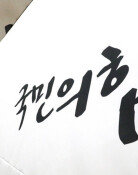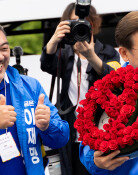[Editorial] Politicizing History
[Editorial] Politicizing History
Posted September. 08, 2004 21:57,
The ruling Uri Party reportedly plans to submit a revision of the special law allowing public probes into pro-Japanese collaborators under colonial rule to the National Assembly. It is regrettable to see attempts to revise a law which hasnt used since its passage at the 16th National Assembly. Since politicizing history continues over the ongoing controversy on ways to unearth pro-Japanese collaboration records, it would have been a rational step to practice the already existing law.
However, the ruling party is attempting to push through the revision. We have to check the DNG of opponents of the special law. This statement by Uri Party Chair Lee Bu-young is interpreted as nothing but a blackmail: Unconditionally support the revision. Most of the pro-Japanese collaborators are dead now. It is natural to demand prudence in investigating what happened at least 60 to 70 years ago. The support-or-oppose dichotomy and petulance should be staved off in unearthing pro-Japanese collaboration records.
The revision, which lacks social consensus, is the Uri Partys bill for its own interest because it does not satisfy the basic requirements as a law: impartiality and fairness. Its clauses on the nine-member fact-finding committee illustrate its deficiency.
Under the revision, the president appoints the nine members with the approval of the National Assembly. Since the ruling party controls a majority of seats, the committee will highly likely be filled with figures who have historical views that meet the governments criteria. What is worse, as it vaguely describes the qualifications of committee members as fairness and independence, the revision paves the way for the committee members arbitrariness. This represents a regressive reform compared with the current law which stipulates that the president will appoint them from among the candidates recommended by the National Assembly.
It also opens possibilities for human rights abuse as it allows subpoenas to be issued against people who refuse interview requests by the committee without particular reasons. It also allows a maximum of a three-year jail term against people who resist probes. As what will be probed is allowed to go public before the conclusion of the probe, the revision also raises concerns about a kangaroo-court-like court of public opinion. All in all, it is filled with problematic clauses.
The Uri Party needs to listen to more diverse opinions before submitting the revision. If they push through the revision, it will be open to criticism that the revision is politically tampered. Righting the wrong of history is important. However, glossing over history on the pretext of it is more erroneous. If this is the case, they will face the judgment of history.
Hong Chan-shik, Editorial writer, chansik@donga.com







